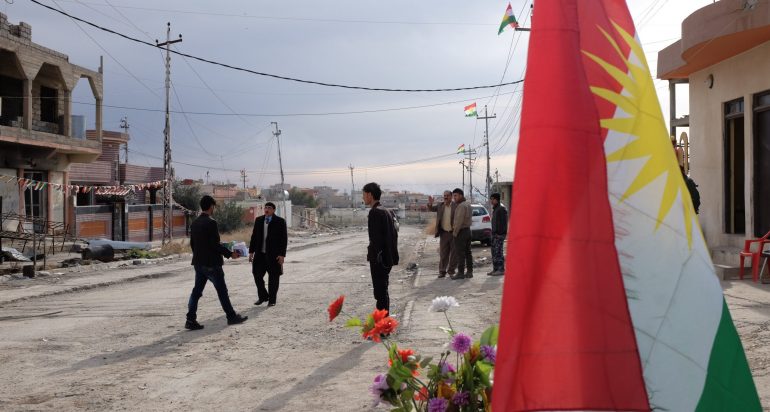One day, Hadi Kheder Youssif noticed an elderly woman’s clothing in the dirt next to his home in Sinjar. After some digging, he discovered bones and what appeared to be a mass grave, a remnant of the Islamic State (IS)’s genocide against Yazidis. After persistent calls spanning several months, the area was cordoned off.
Youssif’s NGO, Tulai, is dedicated to rehabilitating Yazidi survivors of IS captivity and enslavement. However, due to a lack of support, the organization has recently suspended its operations.
The uncovering of a mass grave by Youssif near his home in Sinjar brings into sharp focus the pervasive and ongoing impact of the Islamic State’s atrocities against the Yazidi community.
Ismail Rasho, a Yazidi activist, told me while most Yazidis have their eyes set on emigration abroad, others stay behind to try and uncover the fates of lost family members.
The Islamic State’s violent sweep through Iraq in 2014 saw the abduction of Mona and her ten-year-old sister, Nora, from Sinjar City in the Nineveh province. Mona was taken to Mosul and rescued in 2017, the year the city was freed from IS control.
The fate of Nora remains unknown. Of the 26 family members captured by IS, four, including Nora, were never found.
The last solid proof of life for Nora that Mona’s family had was a photograph taken in Mosul in 2015, showing her at 11 years of age. This photo, delivered to Mona’s uncle by a smuggler, became a crucial clue. Subsequently, the family came to believe Nora might be at the Al-Hol camp in northeast Syria, reportedly seen in the camp’s seventh district according to another smuggler.
A Yazidi survivor’s account might corroborate Nora’s presence in the camp. This witness described Nora in a dire state, suffering abuse at the hands of camp residents loyal to IS. Faced with this distressing information, Mona’s family expressed a profound sense of powerlessness over their inability to rescue her.
Dispersed across the globe, Yazidi families grapple with the heartbreak of lost connections. Among them, Jaid Murad, a Yazidi survivor now in Australia, has become a vocal advocate for his missing relatives since arriving five years ago.
On Aug. 3, 2023, Jaid and several family members narrowly escaped to Sinjar Mountain, a flight marked by the tragic loss of his father, uncle, and some cousins. 45 women and girls from his family, including three cousins and a sister, were taken captive, their whereabouts still unknown.
Jaid’s 32-year-old cousin, Farman, was shot in the leg and couldn’t escape. Jaid’s last update about him came from Arab acquaintances in Sinjar, who reported IS’s capture of Farman, leading Jaid to fear the worst.
In Tal Afar, two of Jaid’s other cousins, Mahbat and Nadia, and his sister Nazdar, were among the thousand captive women and girls held in a school, traded for as little as $10 to $100. Mahbat, bought by a high-ranking IS emir, managed to contact her family. She was later moved to Syria, from where Jaid’s family secured her release.
Jaid had asked Mahbat to give his phone number to other Yazidi women. He last spoke to his sister Nazdar in 2014 when she was in Mosul where a fellow captive let her use her phone.
His cousin Nadia called him in 2015.
She was 12 and was kept under the control of an IS member and abused by three men. Jaid later noticed the number on his WhatsApp under the name Abu Hawija.
The last conversation he had with the man was in 2017. During this conversation, Abu Hawija claimed Nadia as his wife and stated that his sister Nazdar had converted to Islam and was married to a man in Syria.
Many Yazidi survivors are believed to be in the Al-Hol camp, where Mona’s family suspects Nora might still be.
Al-Hol, a vast refugee camp housing 50,000 individuals, predominantly women and children, faces significant challenges. The camp is known for its allegiance to IS among many residents. Syrian Democratic Forces (SDF) guard the camp, which has been plagued by severe security issues.
“There are many children in Al-Hol,” Ismail Rasho told me. He said that Yazidis conceal their identity due to the dominant IS influence in the camp. He says some children may have lost all memory of their families and past lives.
Rasho mentioned a recently rescued Yazidi survivor who reported several Yazidi children in Al-Hol. He advocates for a DNA identification initiative to pinpoint unidentified Yazidis in the camp.
There are intermittent reports of Yazidi women being found and rescued in Al-Hol. In September 2022, the SDF Press Center reported the rescue of an 18-year-old Yazidi woman from Kocho in Sinjar by the Women’s Protection Units, an SDF faction, during a raid on IS sleeper cells. That same month, a 24-year-old woman, also from Sinjar, was rescued.
In June 2023, Yazidi survivor Nadia Murad announced the liberation of six Yazidi women from the camp. “Following extensive investigations, I am profoundly relieved to report the rescue of six more Yazidi women who were held captive by IS,” Murad stated.
Rasho expects more action from the international community, the Iraqi government, and the Kurdistan Regional Government (KRG) in rescuing Yazidi survivors.
In April 2023, Shafaq News reported KRG President Nechirvan Barzani’s commitment to freeing captive Yazidis, announced during the Yazidi New Year commemoration.
The Kidnapped Yazidi Office has aided in rescuing Yazidis, including a 22-year-old woman in September 2023. Hadi Kheder Youssif criticizes the KRG Kidnapped Rescue Yazidi Office, preferring a body managed by international organizations. He told me there’s no organized effort to find Yazidis in Al-Hol.
Families still await the identification of relatives from excavated mass graves. On October 18, a ceremony in Sinjar’s Siba Sheikh Khidir village marked the opening of a mass grave, reported by Voice of Yazidis. Kirkuk Now stated 37 Yazidis were found in this grave. An Al-Jazeera report from August 2023 notes over 80 unexcavated mass graves in Sinjar.
Around 2,700 Yazidis are still missing.


